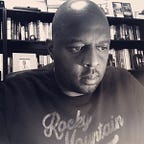Sean Bell, Eurie Stamps, Eric Garner, George Floyd, Rayshard Brooks. Ashé. Love and light in honor of Alfred Clark Jr, also known as my father. In the fall of 1980, my father, Alfred Clark had an eerily similar encounter with law enforcement in the Dorchester section of Boston, MA reminiscent of Sandra Bland. After an alleged intense and “aggressive” conversation my father was arrested and later found dead in an interrogation room. In a time before hashtags led to community uprising, his loss caused a personal revolution within me and would later lead me on a crusade to secure cameras in interrogation rooms. While driving on Father’s Day Eve my mind was fixated on the scores of young people who awakened this morning without their fathers. Members of a group that I pray no one must join again — children of martyrs of the movement those slain in police custody.
I was born a black man and one day I will die a black man, but do not want to be found dead because I am a black man. It has been extremely difficult to understand this perplexing dichotomy. Existing always on the defense. Thriving in survival mode. Pursing excellence despite of. I am aware that I needed a father growing up ;however, my old soul has always taken solace with the fact that my Dad didn’t chose to miss my games or not read me a book before bed — he was taken away from my sister and me. How he was taken has shaped my perspective and purpose. Black fathers not only have to fight the scourge of white supremacy, they are subjected to the narrative that they have made the selfish decision to walk away. This is a dangerously false pathology, sometimes even espoused by black folks. Yes, some males have cowardly bowed out; this is a reality shared across races with a myriad of flimsy excuses. Why have Black fathers’ faces become the symbol of absence when statistically we are the most active, engaged and responsibility sharing demographic? I personally knew fatherhood would be challenging, but like everything in life with growth I am learning to navigate this space, sadly without the most sacred and valuable resource — my own Father. My father was killed at 36; I became a father at the age 36. I search memories faded by time for platitudes to help me be selective with my criticism and resolute as an advocate for my own son. What I find are glimpses of sacrifice and love in action. Learning of my father’s life in news articles that recount when he saved a child that he’d never met from a burning home in the Jamaica Plain section of Boston is one of them. It led to him never being able to walk the same again, making an impact on his life I cannot feel but only read about.
The current situation as they relate to politics, race, and policing across the country have empowered me to stand with others and to activate change by fully engaging this moment. There have been times before today that have left me numb and hopeless. Instances of grieving friends who were incredible fathers, lost too soon to their dear children and loved ones. A reminder that Black Fathers not only fear for their life due to medical neglect and disproportionate health complications, but also due to the mental anguish and despair related to driving our cars to our destinations while reciting silent prayers to return home safely to our families.
I can vividly remember finding a bag tucked away in a closet of my home at 16. In it were my father Alfred’s clothing and artifacts, along with a claim ticket my mother had retrieved upon picking up my father’s belongings from law enforcement. The item that I most fondly remember is the red turtleneck, which is ironic because my son’s favorite color is red. As I see the children of state sanctioned violence grief broadcast on media outlets, I pray they receive the social emotional supports I never did. I wrestled with my own healing alone until fundamentally understanding that I needed therapy to cope, and to save quite frankly myself from my personal trauma. Sound mind and mental health are the cornerstones of strength we need to press on. It is not an overstatement when I assert that black trauma is an epidemic in this county. There are scars we acknowledge and those we ignore, but to be Black in America is to be marked with a singular type of hurt. Both men and women are impacted by the horrors of otherness in our own home. As a Black man, perhaps selfishly, there are days where being both invisible and America’s most wanted seems like the heaviest of burdens. Nonetheless, I have a son whose life and liberty mean even more to me than my own, so I persevere. In memory of my Father and all the people whose lives have ended in police custody my heart is with you. I share your hurt and I carry the mission along with you to honor them in all we stand for.
Tony Clark is a Professor of African-American Lit and Hip-Hop Studies
